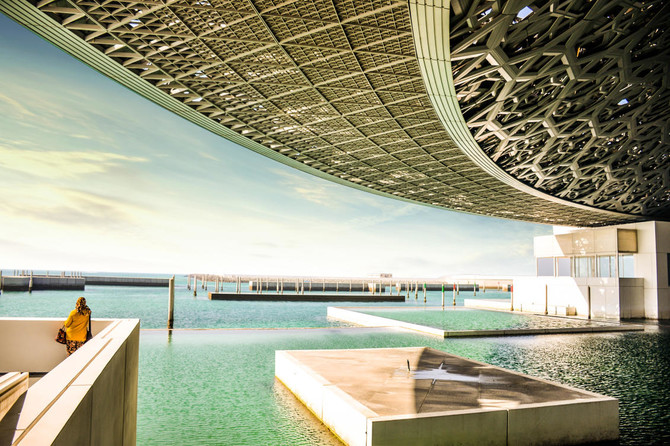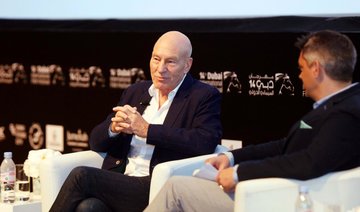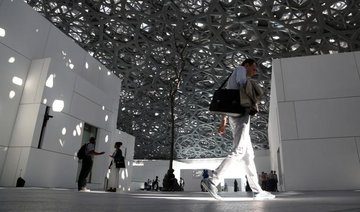London: Abu Dhabi’s top addresses on Saadiyat Island have shed more than a quarter of their value since 2015 new research has found.
Despite the opening of the Louvre on the island in November, prices remain under pressure according to Cluttons even as the sider market shows signs of stabilization.
Sea-facing villas on Saadiyat Island, which are some of the most expensive in the emirate at 1,700 dirhams ($463) per square foot, have seen no movement in prices for the past two consecutive quarters, Cluttons found.
The cost of buying the luxury Saadiyat properties had fallen significantly since 2015, with prices dropping by an average of 26.1 percent, Cluttons said, as the emirate’s economy faltered due to declining oil prices.
Faisal Durrani, head of research at Cluttons, said confidence in the economy is starting to return, encouraging buyers to invest in property again.
“2018 looks set to be a better year for the UAE economy as a whole, with GDP expected to expand by 2.6 percent, from a seven year low growth rate of 1.7 percent last year. This is, in turn, expected to help support more stable rates of job creation and increased government spending as confidence levels improve,” he said.
He added that news at the end of last year that the national oil company Adnoc was planning to spend 400 billion dirhams over the next five years to boost growth is likely to further bolster economic growth.
Edward Carnegy, head of Cluttons Abu Dhabi, said the stabilization of prices is likely to continue this year. “In fact, we have noted a marginal uptick in demand from Emirati buyers predominantly, looking for second homes, or expanding their buy-to-let investment portfolios on Saadiyat Island,” he said.
Other property experts are also noting that the market is beginning to stablize.
Taimur Khan, senior analyst at Knight Frank said: “The short term trends seems to be that the residential market is improving but we are still very likely to see further price falls across the market in 2018. Economic activity in the capital is beginning to recover both in the oil and non-oil sector and this may help spur demand and support the market somewhat.”
Rents across Abu Dhabi’s residential areas have decreased by 2.3 percent in the first quarter of this year, marking a slower rate of decline that the 4.3 percent drop during the final quarter of 2017.
This means rents are 11.5 percent lower than this time last year.
The Cluttons report said that the continued decline in rents reflects some lingering concerns among tenants about potential job losses coupled with the rising cost of living. The introduction of value-added tac (VAT) at the beginning of the year and the increase in inflation, has placed additional pressure of household budgets.
Tenants are more likely to attempt to negotiate more favorable rates with their landlords, said Carnegy.
“As a result, tenants are negotiating reductions at renewal, while landlords are increasingly receptive to meeting the expectations of tenants by agreeing to close deals below headline asking rates, and they are offering flexible rental payments in multiple cheques to attract tenants as well as other incentives such as zero commission payable and rent free,” he said.
Abu Dhabi Saadiyat pads need more than Louvre opening to lift prices
Abu Dhabi Saadiyat pads need more than Louvre opening to lift prices

- Despite the opening of the Louvre on Saadiyat Island in November, prices remain under pressure according to Cluttons even as the sider market shows signs of stabilization.
- The cost of buying the luxury Saadiyat properties had fallen significantly since 2015, with prices dropping by an average of 26.1 percent.
Closing bell: Saudi main index slips to close at 12,217

RIYADH: Saudi Arabia’s Tadawul All Share Index slipped on Sunday, losing 67.36 points, or 0.55 percent, to close at 12,217.05.
The total trading turnover of the benchmark index was SR5.33 billion ($1.42 billion), as 78 of the stocks advanced while 147 retreated.
On the other hand, the Kingdom’s parallel market Nomu rose 109.49 points, or 0.40 percent, to close at 27,195.93. This comes as 30 of the stocks advanced while as many as 27 retreated.
Meanwhile, the MSCI Tadawul Index slipped 7.05 points, or 0.46 percent, to close at 1,530.49.
The best-performing stock of the day was Saudia Dairy and Foodstuff Co. The company’s share price surged 9.97 percent to SR386.20.
Other top performers include Saudi Chemical Co. as well as Al-Jouf Agricultural Development Co.
The worst performer was Thimar Development Holding Co. whose share price dropped by 9.94 percent to SR14.14.
Other subdued performers included Tanmiah Food Co. and Walaa Cooperative Insurance Co.
On the announcements front, Etihad Etisalat Co., also known as Mobily, released its interim financial results for the period ending on March 31.
According to a Tadawul statement, the company’s net profit hit SR638 million in the first quarter of 2024, reflecting a 37.2 percent surge compared to the same quarter last year.
The increase was mainly driven by a rise in gross profits and a jump in earnings before interest, tax, depreciation, and amortization. While operating expenses also increased, financial charges, zakat, and income tax decreased.
Moreover, the Tanmiah Food Co. also announced its interim financial results for the first three months of 2024.
A bourse filing revealed that the firm’s net profit reached SR21 million by the period ending on March 31, unchanged in comparison to the corresponding period in 2023.
Furthermore, Elm Co. announced its interim financial results for the year’s first quarter.
According to a Tadawul statement, the company’s net profits climbed 7.1 percent to reach SR345 million in the first three months of 2024 compared to the same period a year earlier.
This increase is primarily attributed to higher revenue, operating expenses, and income from Murabaha deposits.
Allianz Saudi Fransi Cooperative Insurance Co. also announced its interim financial results for the period ending on March 31.
A bourse filing revealed that the firm’s net profit stood at SR9.98 million at the end of the first quarter of 2024, up 4.01 percent when compared to the same quarter a year ago.
The increase in net profit after zakat and income tax for the current quarter compared to the same quarter of previous years is primarily due to an 86 percent rise in net investment income.
In addition, the United International Transportation Co., or Budget Saudi, announced its interim financial results for the first three months of 2024.
According to a Tadawul statement, the company’s net profit hit SR69.7 million in the first quarter of 2024, reflecting a 0.565 percent surge compared to the same quarter last year.
The surge in net profits is mainly attributed to steady growth in both long-term and short-term rental revenues.
Saudi Electricity Co. also announced its interim financial results for the period ending on March 31.
A bourse filing revealed that the firm’s net profit stood at SR897 million at the end of the first quarter of 2024, up 86.8 percent compared to the same quarter a year ago.
The surge in net profit for the current quarter compared to the corresponding quarter of the previous year is primarily attributed to increased revenue requirements, new earnings from development projects, and higher revenue from Dawiyat Co., among other factors.
Meanwhile, United Electronics Co., or eXtra, has announced that its shareholders approved the election of board members for the upcoming three-year term beginning May 13.
Saudi Arabia’s date sector sees 13.7% export growth in Q1, 2024

RIYADH: Saudi Arabia’s palm and dates sector is experiencing significant growth, with exports increasing by 13.7 percent in the first quarter of 2024 compared to the same period last year.
This food division is regarded as a significant contributor to diversifying income sources and boosting the gross domestic product, as the Kingdom has ambitions to establish its dates as the premier choice globally.
The National Center for Palm and Dates has recently revealed a significant increase in value across various countries during the period, reaching SR644 million ($171.7 million), compared to SR566 million in the first quarter of 2023.
In 2023, the value reported by NCPD increased by 14 percent, reaching SR1.462 billion, compared to SR1.280 billion in 2022. By the end of 2023, the number of countries importing Saudi dates had reached 119.
In an interview with Arab News in March, Mohammed Al-Nuwairan, CEO of NCPD, emphasized that Saudi Arabia’s export portfolio extends beyond dates, encompassing derivatives like molasses, pastes, and others. This diversification enhances the sector’s export presence beyond the Kingdom’s borders.
“East Asian countries are receiving attention from Saudi exports of dates, especially to Singapore, situated in the heart of countries targeted for exporting dates and their derivatives, such as Indonesia, Malaysia, and also China in particular. What supports this is the high demand for Saudi dates, which possess high nutritional values and production quality,” he said at that time.
The total value of date and date by-product exports has surged by 152.5 percent since 2016, rising from SR579 million in 2016 to SR1.462 billion in 2023, marking a compound annual growth rate of 12.3 percent.
According to the Saudi Press Agency, date exports to several countries, including Austria, Norway, and Argentina, as well as Brazil, Portugal, Germany and Canada, exceeded 100 percent.
According to the Saudi Press Agency, date exports to several countries, including Austria, Norway, and Argentina, as well as Brazil, Portugal, Germany, and Canada, exceeded 100 percent.
Additionally, the value of Saudi date exports increased to Morocco by 69 percent, Indonesia by 61 percent, and South Korea by 41 percent. Exports to the UK, the US, and Malaysia rose by 33 percent, 29 percent, and 16 percent, respectively.
Saudi NHC teams up with Chinese firm to construct 20k residential units

RIYADH: Residential supply is set to improve as the Saudi National Housing Co. and China Machinery Engineering Corp. signed a deal to build 20,000 units in the Kingdom.
In a recent agreement signed in Beijing, the two companies joined forces to address housing needs more effectively by constructing apartments in suburban and residential areas within the Kingdom, directly benefiting individuals and families, the Saudi Press Agency reported.
The deal was signed during the official visit of the Minister of Municipal and Rural Affairs and Housing and the Chairman of the Housing Program Committee, Majid Al-Hogail, to China as part of the broader efforts to contribute to achieving the targets of the Housing Program — one of the Kingdom’s Vision 2030 programs.
This initiative aims to partner with leading global companies and attract international investments in the real estate sector.
At the signing ceremony, CEO Mohammed Al-Buty represented NHC.
The company emphasized that this agreement complements its qualitative projects with major global construction companies, SPA reported.
It added that this initiative would be implemented in various areas within the suburbs and urban communities under NHC, distinguished by integrated facilities and services, including health, education, commercial, and public services.
NHC, one of the largest real estate firms in the Middle East, aims to develop housing communities and improve living spaces in the Kingdom by creating nine integrated residential suburbs and delivering 300,000 units by the end of 2025.
The company plans to implement integrated urban projects according to the highest standards at affordable prices, as well as enhance the sustainability of residential projects in various regions in Saudi Arabia.
This comes as the Kingdom aims to elevate services for citizens and unify all efforts across sectors to achieve the targets of the Housing Program in line with the nation’s Vision 2030. This is part of its efforts to increase the homeownership rate for Saudi families to 70 percent.
Last week, NHC signed a deal with China’s CITIC Construction Group to establish an industrial city and logistic zones for building materials. The undertaking will comprise 12 factories aimed at securing supply chains for the Saudi firm’s housing projects.
In a statement, the NHC said the agreement with the Chinese construction group is part of its efforts to secure supply chains for its housing initiatives and ensure their timely completion and high quality.
The Saudi company said the deal entails the construction of 12 factories specializing in building materials, harnessing Chinese expertise, and an uplift in business standards by local factories.
It added that the agreement also aims to draw top-tier service providers across various company sectors, its subsidiaries, and other projects.
GCC prioritizes economic diversification for sustainable growth, says official

RIYADH: The Gulf Cooperation Council aims to reduce reliance on oil revenues by implementing a comprehensive vision for economic diversification, as emphasized by its Secretary-General, Jasem Al-Budaiwi.
During the Gulf Creatives Conference, organized by the Diwan at Harvard University in Cambridge, Massachusetts, Al-Budaiwi outlined a vision that embraces diverse sectoral reforms. These initiatives are aimed at strengthening economic resilience and attracting foreign investments, the Saudi Press Agency reported.
He noted GCC countries have positioned themselves as competitive digital hubs on the global map, supported by their favorable geographic location and young population.
“The strategic location, coupled with robust infrastructure, paves the way for the council member states to attract international partnerships that support their long-term development goals,” Al-Budaiwi said.
He added: “This dynamic approach is vital for sustaining economic growth and ensuring the resilience of Gulf economies in the face of global economic fluctuations and regional challenges.”
Additionally, Al-Budaiwi emphasized the numbers and data supporting these plans and showcased the advancements made by GCC nations, including the establishment of the Customs Union, the GCC Common Market, and the Unified Economic Agreement. He cited Saudi Arabia’s NEOM project as an example of urban development initiatives within GCC nations.
He explained that smart cities are designed to reduce waste, enhance energy efficiency, and streamline urban management by leveraging artificial intelligence and the Internet of Things.
He continued by stating that this further underscores the GCC nations’ commitment to technologically advanced and environmentally friendly urban design, as well as the increased emphasis on cybersecurity to mitigate growing risks and maintain confidence in the digital economy.
Moreover, Al-Budaiwi emphasized the transition from oil-dependent to diversified economies and expressed satisfaction with the outstanding economic and integration achievements of the GCC countries.
In February, he held a series of meetings in Riyadh with foreign ambassadors to Saudi Arabia.
Al-Budaiwi met with the South Korean Ambassador to Saudi Arabia, Choi Byung Hyuk, at the general secretariat headquarters in Riyadh.
During the meeting, the secretary-general discussed the developments in the free trade agreement between the GCC countries and South Korea, which was signed in December 2023.
Both sides expressed their desire to enhance cooperation between nations and increase focus on mutual interests such as education, health, investment, and pharmaceuticals.
The meeting also reviewed relations between the GCC and South Korea, emphasizing the importance of enhancing strategic dialogue through the areas of cooperation outlined in the joint action plan.
Expat remittances from Saudi Arabia hit $3.2bn in March

- The upswing is the highest since June 2022, SAMA data shows
RIYADH: Remittances by expatriates in Saudi Arabia grew 28 percent in March as compared to the preceding month to reach SR11.96 billion ($3.2 billion), the highest since 2022, official data showed.
The launching of new development projects in the Kingdom has led to an increase in the expatriate population, as they actively contribute to the growth of business activities. This, in turn, may have influenced their remittance patterns.
This growth in remittances is also exemplified by the Regional Headquarters Program, which has successfully attracted over 200 companies from across the globe to obtain licenses to set up their regional bases in Saudi Arabia.
These entities are driven by the prospect of securing lucrative government contracts. Additionally, the ongoing structural reforms to enhance foreign direct investment have further stimulated business growth in the Kingdom.
Alongside regulatory reform, Saudi Arabia has undergone modernization in its legal governance and enforcement practices such as digitization of employment contracts, virtual court hearings, and provision of online government services. These initiatives are integral components of a broader set of reforms aimed at positioning the Kingdom as one of the leading nations in terms of ease of doing business.
However, on a quarterly basis, there was a 0.34 percent decrease in expat remittances compared to the same period last year. This trend can be attributed to Saudi Arabia’s evolving economic landscape, particularly the implementation of financial sector reforms, which are increasingly enticing residents to invest a portion of their earnings within the Kingdom.
In February of this year, a report by Jadwa Investment noted that workers’ remittances were unexpectedly low despite the influx of expatriates.
This phenomenon according to their report may suggest that some expatriates opted to capitalize on the high savings rates in the Kingdom instead of remitting funds home.
The Saudi Central Bank, also known as SAMA, has raised key policy rates multiple times in 2022 and 2023, given that the Saudi currency is pegged to the dollar. This move aligns with the actions taken by the US Federal Reserve, which has been gradually increasing interest rates as part of its strategy to address inflationary pressures.
Conversely, remittances from Saudis saw a 9 percent monthly increase, totaling SR5.11 billion, yet experienced a quarterly decline of 0.53 percent.
The occurrence of Ramadan in March this year likely influenced the increase in Saudi remittances for this month. During this holy month, individuals often engage in increased charity, support their families, and fulfill religious obligations, such as zakat.















